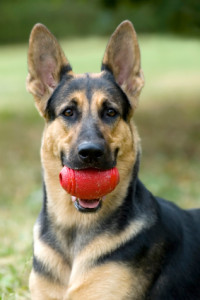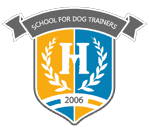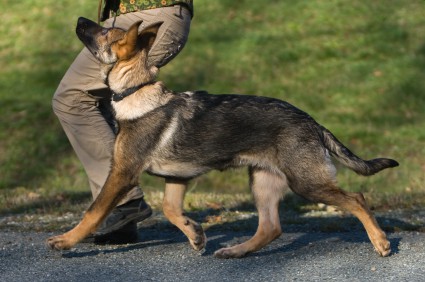Understanding and Applying Competition Obedience Training
Competition obedience training is an important part of many dog activities. Dog sports and events such as Rally Obedience, AKC Obedience, Schutzhund, IPO, PSA and many other events, require at least some form of competition obedience training and focused heeling. Obtaining this level of obedience is not impossible, but there are a few things that you should understand before you begin.
It doesn’t happen overnight! Learning competition obedience training will take time for both you, as the trainer, and the dog that you are working with. One of the most successful ways to teach competition obedience training is to establish a plan and utilize successive approximations to meet your goals. By using successive approximations, you will be breaking each exercise or aspect of the training down into its smallest parts to teach. For example, you will want to teach the dog to watch first, before trying to teach it to watch while heeling. Then, you will link these parts together in a way to create the functions that you want. Trying to rush the process will never lead to a successful outcome. This will take time.
 Understand what motivates your dog! Dogs that are selected for competition obedience training are almost always highly motivated dogs that are capable of focusing on a reward or reinforcement for extended periods of time. Often, we will find that these dogs are motivated by a number of things such as balls, tugs, food, etc. Each of these rewards will likely hold a higher or lower value than others and this information can be important to our training. There may be certain exercises where a high value toy will cause the dog to actually break his/her position to get to the toy instead of staying in place. Using a lower value reward in this instance can often be more effective. Many exercises that are expected of the competition dog will require that they perform at their highest level and this is where the high value rewards will be most useful.
Understand what motivates your dog! Dogs that are selected for competition obedience training are almost always highly motivated dogs that are capable of focusing on a reward or reinforcement for extended periods of time. Often, we will find that these dogs are motivated by a number of things such as balls, tugs, food, etc. Each of these rewards will likely hold a higher or lower value than others and this information can be important to our training. There may be certain exercises where a high value toy will cause the dog to actually break his/her position to get to the toy instead of staying in place. Using a lower value reward in this instance can often be more effective. Many exercises that are expected of the competition dog will require that they perform at their highest level and this is where the high value rewards will be most useful.
Technique is everything! Learning the proper technique, body movement and understanding effective communication with your dog are all critical keys to making competition obedience training successful. If available, it can often be beneficial to work with a dog that already has a solid foundation in competition obedience training. A fully trained dog will be more forgiving of your mistakes and will actually help teach you the proper technique for working with these dogs. This will also allow you the opportunity to work more comfortably on your technique without being overly concerned with making mistakes with the dog.
Our School for Dog Trainers offers a number of courses to teach students a broad variety of techniques for training dogs. If you are interested in learning more about competition obedience training or are interested in training dogs as a career, feel free to give us a call at 866.200.2207 or email learntotraindogs@highlandcanine.com

